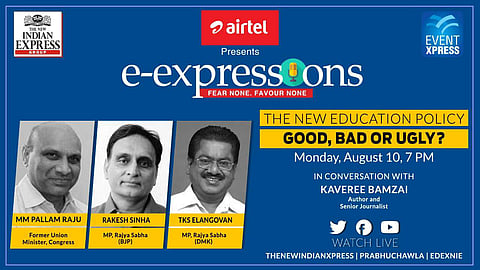

The new National Education Policy does not impose Hindi but only proposes to teach the children in their mother tongue, said BJP Rajya Sabha MP Rakesh Sinha while speaking at The New Indian Express' e-expressions. He was debating the pros and cons of the recently released NEP with the Indian National Congress' MM Pallam Raju, DMK's Rajya Sabha MP TKS Elangovan and senior journalist Kaveree Bamzai.
Sinha said that Hindi does not pose a threat of imposition on any Indian language, rather the real threat is from English. "No Indian language is threatened by Hindi and neither is Hindi threatened by them. But they are all threatened by the domination of English. We are not against English — it is a very important means of communication but that does not mean you will impose it right from a child's birth. Education in the mother tongue is considered most scientific. Children grasp more in their mother tongue," he added.
Tamil Nadu has been at the forefront of the battle against Hindi imposition and Elangovan explained why they do not find the three-language set up very exciting. "In 2006, we faced this problem. Kalaignar (M Karunanidhi) was the CM and he worked out a method — education will be in Tamil but children with different mother tongues will also learn that language in the school. Everyone accepted that. We are not against any single language. We do not want one language to be imposed on us which is different from learning a language or studying in a language. Hindi Prachar Sabha is there in Tamil Nadu and no one is preventing students from going there," he said.
Raju, a former Union HRD Minister, said that English cannot be ignored as it has become the global language and the language of opportunity. "There should not be any rigidity when it comes to language. If you see the government schools across the country, the teachers are teaching in the local language because they don't have teachers who know English. The learning goes on. In the private schools, the medium of instruction is English and there is a lot of interest among parents to put their children in private schools and English medium schools because they see shortcomings in the government schools," said the former minister. "I think we should address this imbalance and not necessarily impose the mother tongue in the private schools. A lot of my classmates who had studied in Telegu medium schools express themselves so well in English. The important thing is how coherently you express yourself. I am not undermining our mother tongue but I think we need to look at the languages of opportunity," he added.
The NEP is not only progressive but tends to the educational requirements of the country, but also takes care of employment opportunities, said Sinha. "This education policy is not only intended to create 100 per cent literacy but also 100 per cent employment. We have to change the midset — job means self-reliance. In Gujarat, people go for self-employment after education is complete. But on the contrary, in Bihar, people go for government jobs. UPSC is the finest job for them. That needs to change," said Sinha.
Commenting on the NEP's proposal to let the top 100 global universities to set up base in India, Elangovan said, "We have opposed the idea of bringing in foreign universities even when it was proposed during the UPA 2 regime. Why should we bring in foreign universities when we have the skills. We can adapt their syllabus but why should we let them make money from here."
The NEP talks about strengthening the research infrastructure of the country and Sinha welcomed the move dubbing it the way to stop the brain drain. "When Indians go abroad for research we are asked to work on the empirical part of the research and not the critical analysis. We are basically the ants and collect data while the Europeans are the spiders. The education policy creates a happy blending between the ant and the spider — empirical study and its critical analysis. This will deter the brain drain," said Sinha. "For the NEP to be implemented, 6 per cent of GDP being invested in education is needed and we must believe that the government will do that. How they will do it is up to the Finance Minister and the government to delineate on these," he added.
One of the concerns that the critics of the policy raised were that the revamp of the syllabus might lead to its "saffronisation". Commenting on the issue, Raju said that all stakeholders should be made a part of the process. "We should not frame the new syllabus in a way that we alienate parts of our own population. We are all proud of our culture and heritage and measures should be taken to ensure that these are represented properly. at the same time, it has to be a very forward-looking syllabus — the world is changing rapidly, concerns of environment, ecology and how technology is impacting our lives and the new vocational skills one needs now — the focus should be on these. They should involve all the stakeholders in what looks like a lot of focused work," he added. Commenting on the issue, Sinha added, "This education policy is reviving and resurrecting the Indian knowledge traditions."
